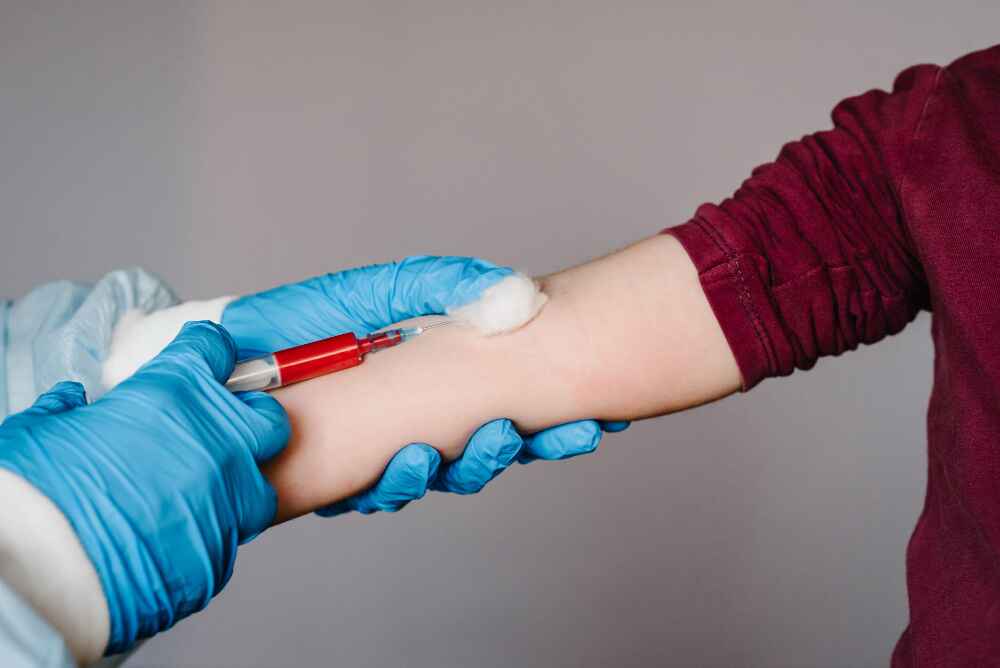Book on Whatsapp
9892101616
SGPT and SGOT Test Normal Range Levels and What They Indicate
Blood Test
Fri Jan 24 2025
The article will discuss the evaluation of liver function, blood tests called SGPT (Serum Glutamate Pyruvate Transaminase) and SGOT, which (Serum Glutamate Oxaloacetate Transaminase) are mainly performed.
The article will also discuss the liver's primary place for these enzymes, which are also found in the heart, muscle tissue, and kidneys. They are also referred to as ALT (alanine synthetase) and AST (aspartate synthetase), respectively. It is a very crucial test for the identification of liver damage, tracking the development of liver disease, and assessing how well treatments are performed.
SGPT (ALT) and SGOT (AST) Indicate
The enzymes SGPT and SGOT both play a role in the body's amino acid conversion. They play a role in the metabolism of proteins and energy. However, the amount of these enzymes is higher in the liver. The release of SGPT and SGOT in the circulation as a result of inflammation or damage to the liver cells causes elevated levels. Therefore, keeping an eye on these enzyme levels provides valuable insight into liver health.
While SGPT is more specific to the liver, SGOT is found in a variety of tissues, including the heart, muscles, and the liver organ. Therefore, while elevated SGOT values may indicate liver issues, they may also indicate abnormalities in the heart or muscles.
Normal Range Levels
The typical ranges of references for the SGPT and SGOT can differ slightly based on age, gender, the laboratory, and other variables. Nonetheless, the following general rules apply to normal enzyme levels:
- The normal range for SGPT (ALT) is 7 to 56 units per litre (U/L) of blood.
- Values outside of this range could be a sign of inflammation or liver damage.
- The normal range for SGOT (AST) is 10 to 40 units per litre (U/L) of blood.
As a result, it is crucial to consider additional tests along with clinical findings when interpreting these test results.
What Elevated SGPT and SGOT Levels May Indicate
1. Liver Disease:
- Hepatitis, which can cause inflammation of the liver, is one viral infection that can cause an increase in SGPT and SGOT.
- Fatty Liver Disease (NAFLD): Individuals with a condition called fatty liver, which can be brought on by weight gain, diabetes, and alcohol use, frequently have elevated SGPT levels.
- Cirrhosis: This condition causes the liver to become scarred and unable to function normally, which raises the levels of SGPT and SGOT.
2. Alcoholic Liver Disease:
- Increased SGPT method and SGOT levels are a symptoms of an alcoholic liver disorder, which is brought on by prolonged alcohol use. In alcoholic liver disease, SGOT is frequently disproportionately greater than SGPT.
Interpreting Test Results
When excessive SGPT and SGOT levels are discovered, medical care frequently suggests further testing to identify the underlying cause. It also includes liver function tests, imaging examinations (CT scan, ultrasound), and tests for certain infections like hepatitis. It will determine the underlying enzymes. The modification of lifestyle avoiding alcohol, lowering weight, or controlling underlying medical issues like diabetes may be adequate for people with slightly increased SGPT and SGOT levels. Medical intervention may be necessary to treat the underlying illness in cases of serious liver damage.
Conclusion
Tests like SGPT and SGOT are essential for evaluating liver health and identifying possible liver, heart, and muscle problems. Additionally, it was determined that while elevated levels may suggest liver inflammation or injury, normal levels of these enzymes aid in ensuring the liver functions properly. To address any underlying issues and stop more liver damage, early detection and action are essential. To ensure prompt diagnosis and treatment, it is crucial to see a healthcare professional and have these tests performed if someone exhibits symptoms like exhaustion, jaundice, or unexplained pain.
Related Tests
Related Packages
Related Blogs

Blood Test
Health Benefits of Blood Donation You Should Know
You may have seen health camps encouraging men and women of eligible ages to donate blood at least once a year. But have you ever wondered—is blood donation actually good for your health?
The answer is a resounding yes.
However, the primary motive of donating blood is to help someone in need, provide them a second chance at life. It is also surprisingly beneficial for the donor. From improving heart health to giving your body a gentle detox, regular blood donation is a simple act that offers powerful returns.
Benefits of blood donation
1. Natural cleanser: Donating blood acts as a natural body cleanser. It affects perfluoroalkyl levels and those of polyfluoroalkyl substances. It reduces skin-related disorders and encourages blood flow. It reduces acne and skin problems.
2. Improves cardiovascular health: Donating blood reduces the chances of cardiovascular issues and heart attacks. It reduces haemoglobin and iron amounts in the body, and blood pressure, and improves blood circulation.
3. Free health check-up: While donating blood at a health camp, you enjoy receiving free health checkups. Healthcare professionals understand your health vitals before the procedure. They test blood pressure and haemoglobin levels. You don’t have to pay for these checkups.
4. Promotes hair growth: After donation, the body produces new blood cells. It stimulates hair follicles while boosting new hair growth.
5. Screening infections and diseases: Health professionals screen your body to identify infectious diseases. It is a mandatory step. They test blood for a variety of diseases, including HIV, virus, malaria, etc.
6. Save lives: By donating blood, you get the opportunity to save precious lives. It includes cancer patients and those suffering from burns or traumatic injuries. You obtain their blessings.
What to do and avoid before and after blood donation?
- Have iron-rich food: Avoid fatty, unhealthy meals. They promote new blood cells.
- Pain relievers or blood thinners: Avoid them before donating blood.
- Get sufficient sleep: Take rest before donating blood. Be relaxed and avoid panic on blood donation day.
- Avoid drinking and smoking: Practice this at least two days before donating blood, as it could increase blood pressure. Moreover, it might reduce the amount in the blood.
- Avoid straining yourself: Performing rigorous exercises after donating blood should be avoided. Do not consume alcohol, smoke, or drugs for a day.
- Rest: After donating blood, A healthcare professional will supervise you. Do not lift heavy weights or perform strenuous physical activities for about hours.
Enjoy the selfless deed!

Blood Test
5 Routine Blood Tests That Help Detect Health Issues Early
Monitoring your health routinely with blood tests is one of the simplest ways to identify an issue before it becomes serious. Blood tests are helpful in providing valuable information about your body's function and can reveal areas of concern. If you're habitual in your routine check-ups, you can effectively make decisions that will benefit your health down the road.
Here are five blood tests worth noting that can help highlight health issues early on.
1. Complete Blood Count (CBC)
A Complete Blood Count, or CBC, is a standard test that looks at several components of your blood, such as red blood cells, white blood cells, and platelets. It can reveal infections, anemia, immune system disorders, and blood cancers.
Even if you feel fine, some health care providers suggest having a CBC once a year because it is part of a regular health screening. Diagnostic centers you trust, like manipaltrutest.com, offer fast, accurate, and high quality CBC tests to help you to be proactive about your health risks.
2. Blood Sugar Test
Elevated blood glucose can lead to diabetes, which can eventually lead to heart, kidney, eye, and nerve damage if lost to detection. For example, a simple fasting blood sugar test or HbA1c test provides a picture of your blood sugar control through time.
Preventing long-term complications is possible if you are diagnosed early with a blood sugar test. It will allow you to make lifestyle changes or take treatment when necessary to lower your blood sugar. If you have a family history of diabetes, then it is even more important to have your blood sugars tested regularly.
3. Lipid Profile
A lipid profile measures the levels of cholesterol and triglycerides in your blood. High cholesterol is a major risk factor for heart disease and stroke. This test checks your total cholesterol, good (HDL) cholesterol, bad (LDL) cholesterol, and triglycerides.
With early detection, you can take action by adjusting your diet, exercising more, or taking prescribed medications. Health centers offer complete lipid profile tests with clear reports and expert guidance.
4. Liver Function Test (LFT)
The liver is an important organ needed for digesting food, storing energy, and removing toxins. A Liver Function Test (LFT) will check for enzymes and proteins that can indicate how well your liver is functioning. Abnormal test results can indicate infections such as hepatitis, liver damage from alcohol or other underlying medical conditions. A regular LFT is critical, as often liver problems do not manifest any symptoms in their early stages. Regardless of whether or not you feel any pain, having your liver function checked now and again gives you peace of mind and could save your life. For peace of mind, consider having this test done once a year.
5.Thyroid Function Test
The thyroid controls your metabolism, energy, among other functions in the body. A Thyroid Function Test examines hormone levels such as T3, T4, and TSH to determine if your thyroid is underactive (hypothyroidism) or overactive (hyperthyroidism). Symptoms such as exhaustion, mysterious weight gains or losses, or mood changes could indicate a thyroid issue. Testing your thyroid health sooner rather than later allows you the opportunity to address and prevent complications that hinder your health and wellness.
Testing services such as Manipal TRUtest gives you the peace of mind of knowing that an reputable provider will have your results into the system quickly and efficiently, so you can continue to monitor your health.
Routine blood tests represent more than measurement of numbers on a report, they give a clearer picture of what is happening inside your body. Identifying health problems at the early stages can empower you with choices for your treatment; putting you in control and giving you a better chance of a longer healthier life.
When you choose to make routine health screenings a regular feature of your health through initiatives such as manipaltrutest.com, you are taking a step towards your health and a better future with less worry.

Blood Test
Book a Blood Test from Home with Trusted Options in Mumbai
In today’s fast -paced world, health should always remain a priority. However, making the time to visit a diagnostic center can sometimes be difficult. That’s where Manipal TRUtest comes in providing you with the ease of booking a blood test from the comfort of your home in Mumbai. With this trusted platform, getting your health checked is now easier, safer and faster, than ever before.
Why Choose Manipal TRUtest for Home Blood Testing?
With years of experience, state of –the- arts technology, and a patient-first philosophy, the service guarantees that your health is always in the best hands. The home blood collection facility is designed to provide maximum comfort, with zero compromise on quality or hygiene.
Getting booked for a blood test via this site is easy, and fast. It may be a routine health examination, preventive tests, specific tests, or it has an array of options. You can also book the slot online and get the sample picked up at your place without much trouble.
How Does the Home Sample Collection Work?
The process is designed to be simple and convenient. Once you have scheduled your test – either online or over the phone - a certified phlebotomist will arrive at your doorstep at the appointed time. They come fully prepared with sterilized kits and adhere to strict hygiene standards to ensure your safety. After collecting your sample, you’ll receive your reports online, eliminating the need to visit a diagnostic center.
The team behind this service is committed to making healthcare accessible for everyone. With a strong presence across Mumbai, assistance is just a call or click away.
Benefits of Booking a Blood Test from Home
- Convenience: Skip the travel and long queues. Book a test at your preferred time, all from the comfort of your home.
- Safety: Our phlebotomists follow strict hygiene practices, using gloves, masks, and sterilized equipment at all times.
- Detailed Reports: Advanced diagnostic technology ensures accurate and reliable test results you can trust.
- Affordable Pricing: Access premium diagnostic services at competitive rates—with no hidden charges.
- Wide Test Menu: From basic blood sugar checks to comprehensive full-body packages, a wide range of tests is available to meet your health needs.
Booking a Test is Simple
- Visit www.manipaltrutest.com
- Select your required test or health package.
- Choose your preferred date and time.
- Enter your details and confirm your booking.
- Sit back and relax —we’ll take care of the rest!
Trusted by Thousands across Mumbai
When it comes to healthcare, trust matters. Thousands of families across Mumbai rely on Manipal TRUtest for their diagnostic needs.
We’re honored to support you on your journey to better health and are committed to delivering consistent, convenient service every step of the way.
Whether you need a routine check-up or a specialized test, we handle everything—from booking to sample collection to report delivery—with care and professionalism.
Book a home blood test in Mumbai with Manipal TRUtest—your well-being is our top priority.
